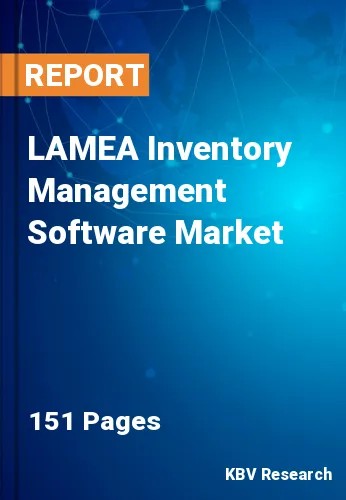The Latin America, Middle East and Africa Inventory Management Software Market would witness market growth of 13.1% CAGR during the forecast period (2023-2030).
IMS automates inventory management, simplifies the tasks to track inventory effectively, manages reorders, and updates accounting data. Companies use this software to minimize product overstocks and interruptions. It is a tool to organize inventory data that used to be stored in traditional formats, such as copies or spreadsheets. Implementing IMS reduces the costs associated with manual inventory tracking and the risks of human errors. Businesses can optimize stock levels, minimize holding costs, and enhance operational efficiency. Automation ensures accuracy in inventory tracking, reducing discrepancies and improving the precision of stock levels. Therefore, without compromising product availability, businesses may make data-driven decisions and maintain lean inventory.
IMS provides scalability, accommodating the increasing volume of products and transactions without sacrificing efficiency. This scalability is particularly beneficial for growing e-commerce businesses and multinational corporations. Modern IMS solutions integrate with other enterprise systems, such as ERP (Enterprise Resource Planning) and CRM (Customer Relationship Management). This integration facilitates a comprehensive view of business operations, enabling better decision-making and enhancing overall organizational efficiency.
According to the International Trade Administration (ITA), in 2020, Saudi Arabia accounted for nearly 52% of all vehicles sold in the Gulf Cooperation Council (GCC) and 35% in the MENA region. In Saudi Arabia, 556,000 vehicles were sold in 2019 and 436,000 in 2020. Sales are anticipated to reach 543,000 units by 2025, with only 32,000 units being electric vehicles. Saudi Arabia's Vision 2030 outlines a comprehensive plan to diversify the economy, reduce dependence on oil, and promote various sectors, including the automotive industry. By 2031, the UAE desires to grow manufacturing by 30% and GDP by $6.8 billion. Due to the above-mentioned factors, the IMS market will grow significantly in this region.
The Brazil market dominated the LAMEA Inventory Management Software Market by Country in 2022 and would continue to be a dominant market till 2030; thereby, achieving a market value of $88.3 million by 2030. The Argentina market is showcasing a CAGR of 13.7% during (2023 - 2030). Additionally, The UAE market would register a CAGR of 12.8% during (2023 - 2030).
Based on Enterprise Type, the market is segmented into Large Enterprises, and Small & Medium Enterprises (SMEs). Based on Deployment, the market is segmented into On-premises, and Cloud. Based on End-use, the market is segmented into Manufacturing, Retail & Consumer Goods, Automotive, Energy & Utilities, Healthcare, and Others. Based on Application, the market is segmented into Inventory Control & Tracking, Order Management, Asset Management, Scanning & Barcoding, and Others. Based on countries, the market is segmented into Brazil, Argentina, UAE, Saudi Arabia, South Africa, Nigeria, and Rest of LAMEA.
Free Valuable Insights: The Worldwide Inventory Management Software Market is Projected to reach USD 4.7 Billion by 2030, at a CAGR of 11.2%
The market research report covers the analysis of key stake holders of the market. Key companies profiled in the report include Zoho Corporation Pvt. Ltd., IBM Corporation, Oracle Corporation, Lightspeed Commerce Inc., CIN7 Limited, Linnworks, Intuit Inc., Acumatica, Inc., Fishbowl Inventory and Brightpearl (Sage Group plc).
By Enterprise Type
By Deployment
By End-use
By Application
By Country
Our team of dedicated experts can provide you with attractive expansion opportunities for your business.

